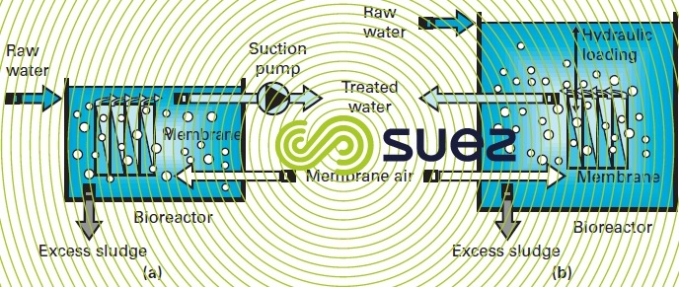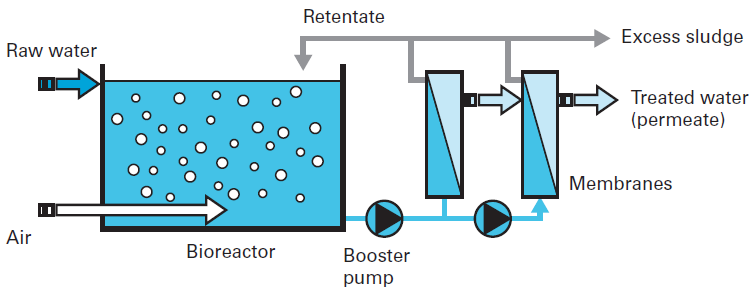Exploring the Benefits of Membrane Bioreactor in Municipal Wastewater Plants
Just How Membrane Bioreactors Are Changing Water Purification Equipments
The appearance of membrane layer bioreactors (MBRs) stands for a substantial advancement in the field of water purification, merging biological treatment processes with cutting-edge membrane filtration technologies. As global water scarcity intensifies, the role of MBRs in helping with drinkable water reuse and sustainable water management becomes increasingly crucial.
Summary of Membrane Bioreactors
Membrane bioreactors (MBRs) stand for a substantial innovation in water filtration modern technology, as they incorporate organic treatment processes with membrane layer purification. This assimilation improves the effectiveness of wastewater treatment by making use of microbes to break down organic pollutants while simultaneously employing semi-permeable membrane layers to separate treated water from put on hold microorganisms and solids.
The MBR system usually contains an organic activator where the microbial population metabolizes contaminants, adhered to by a membrane layer filtration device that maintains biomass and enables just tidy water to pass through. This twin performance results in greater effluent high quality compared to standard treatment methods. MBRs can be run in both batch and continual flow settings, using flexibility in layout and application.
They likewise enable the healing of water for reuse, hence adding to water sustainability initiatives. Generally, MBRs are at the forefront of enhancing water therapy performance and quality, showcasing the capacity for cutting-edge solutions in environmental administration.
Benefits of MBR Innovation
The combination of biological treatment with membrane purification supplies various advantages for water filtration procedures. Among the primary benefits of Membrane Bioreactor (MBR) innovation is its capacity to properly remove both inorganic and natural impurities, bring about top quality effluent. The membranes function as a physical obstacle, protecting against put on hold solids and virus from passing through, which enhances the overall safety and reliability of treated water.
Furthermore, MBR systems need a smaller footprint compared to traditional treatment methods, enabling much more effective area usage. This small design is particularly beneficial in urban settings where land is limited. MBRs also show functional adaptability, fitting differing influent high qualities and flow rates without significant efficiency destruction.
Moreover, the procedure provides enhanced nutrient removal capacities, specifically for nitrogen and phosphorus, which are important for stopping eutrophication in getting waters. The decreased sludge production linked with MBR modern technology likewise translates to lower disposal prices, making it a cost-efficient option in the future - Membrane Bioreactor. Overall, the benefits of MBR innovation position it as a leading choice for sustainable and cutting-edge water purification systems, addressing both ecological and economic concerns
Applications in Water Filtration
Applications of Membrane Bioreactor (MBR) modern technology in water filtration are diverse and impactful, dealing with numerous treatment needs throughout multiple fields. MBRs efficiently combine organic treatment procedures with membrane filtering, making them optimal for municipal wastewater therapy, commercial effluent administration, and also drinkable water reuse campaigns.
In metropolitan settings, MBRs are significantly utilized to boost the high quality of treated wastewater, enabling compliance with rigorous discharge policies and promoting the recycling of water for irrigation and non-potable usages. Their compact style also makes them appropriate for city environments where area is restricted.
Industrially, MBR innovation is made use of to treat process water and wastewater, specifically in sectors such as food and drink, drugs, and textiles. By successfully getting rid of contaminants and suspended solids, MBRs aid industries reduce ecological influences while recovering useful sources from wastewater streams.
Moreover, MBRs are acquiring grip in decentralized water therapy applications, where small-scale systems can be deployed in remote areas or creating regions. This versatility allows areas to attain sustainable water management options, boosting accessibility to tidy water while reducing reliance on conventional therapy approaches.
Instance Researches and Success Stories

In one more instance, a fabric manufacturing center in Bangladesh took on MBR technology to address its wastewater obstacles. The system decreased chemical oxygen need (COD) degrees from 1,200 mg/L to less than 100 mg/L, therefore fulfilling regulatory requirements and dramatically minimizing environmental influence.
The College of Cape Town's MBR setup has actually confirmed effective in treating greywater for non-potable reuse on school. This task not only conserves drinkable water yet additionally serves as an academic design for lasting techniques.
Furthermore, a seafood processing plant in Norway used MBR modern technology to deal with effluents containing high levels of raw material, accomplishing over 90% toxin elimination. These study underscore MBR technology's flexibility and its crucial function in boosting water top quality throughout varied applications.
Future of Water Therapy Solutions
As international water deficiency and air pollution challenges magnify, innovative water treatment services are becoming increasingly vital to make sure sustainable access to clean water. click over here now The future of water treatment lies in the integration of innovative modern technologies that boost the performance and performance of filtration procedures. Membrane bioreactors (MBRs) are at the forefront of this advancement, incorporating organic therapy with membrane filtration to produce high-quality effluent ideal for numerous applications.

Arising trends such as resource healing from wastewater, consisting of nutrients and power, will certainly better transform treatment facilities into environment-friendly centers. In addition, advancements in nanotechnology and membrane materials promise enhanced performance and durability of filtering systems.

Final Thought
Finally, membrane bioreactors represent a substantial advancement in water purification modern technologies, efficiently integrating organic treatment with sophisticated membrane layer purification. The numerous advantages, consisting of boosted effluent quality and minimized spatial needs, make MBRs particularly suitable for metropolitan applications. Their duty in safe and clean water reuse and sustainable water management highlights their value in resolving global water scarcity difficulties. Continued r & d will certainly further enhance the effectiveness and fostering of MBR modern technology, ensuring a resilient future for water treatment services.
The emergence of membrane layer bioreactors (MBRs) stands for a substantial innovation in the area of water filtration, merging biological treatment procedures with sophisticated membrane layer filtering innovations. As worldwide water scarcity magnifies, the role of MBRs in facilitating safe and clean water reuse and lasting water administration ends up being increasingly critical. They additionally make it possible for the healing of water for reuse, thus adding to water sustainability initiatives.As worldwide water deficiency and contamination difficulties magnify, cutting-edge water therapy services are becoming significantly necessary to guarantee lasting accessibility to clean water. Their duty in drinkable water reuse and sustainable water monitoring highlights their significance in addressing international water shortage challenges.